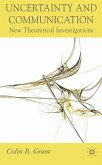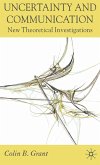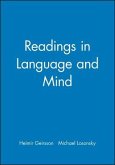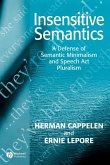Thoughts and Utterances is the first sustained investigation of two distinctions that are fundamental to all theories of utterance understanding: the semantics/pragmatics distinction and the distinction between what is explicitly and what is implicitly communicated. The central claim of this book is that the linguistically encoded meaning of an utterance underdetermines the propositions explicitly communicated by the utterance. The arguments and analyses are developed within the relevance-theoretic framework of Dan Sperber and Deirdre Wilson, so the approach is resolutely cognitive, focussing on the representational levels and mental processes involved in utterance interpretation. However, extensive comparison is made throughout with other pragmatic frameworks, including those of Paul Grice, François Recanati and Kent Bach, which are more philosophically based, and that of Stephen Levinson, which has a more linguistic and computational orientation. Finally, this volume assesses and attempts to reconcile the different perspectives of theories of human semantic competence and accounts of the pragmatic processes involved in communication and interpretation.
Hinweis: Dieser Artikel kann nur an eine deutsche Lieferadresse ausgeliefert werden.
Hinweis: Dieser Artikel kann nur an eine deutsche Lieferadresse ausgeliefert werden.
"This book serves to advance the status of pragmatics, as inaddition to presenting a theory free from serious errors, it isalso a good example of a methodologically sound book. I heavilyapplaud this volume - which places students on the right path andis also a rare example of scholarly eminence. I believe the authormust have had many sleepless nights to finish it - now she can takeher rest and enjoy the success and the praise she fully deserves."Linguistics
"Challenges current philosophical approaches to pragmatics andmakes a substantial contribution to cognitive pragmatic theoriessuch as relevance theory." Moderna Sprak
"The book brings together a wealth of empirical observations andnew analyses and is impressive in breadth and depth. It is also oneof the most detailed and powerful expositions of relevance theoryand enriches the framework in considerable ways."Lingua"This long-awaited treatise is the best case ever madefor relevance theory, and a most stimulating piece of work on thesemantics/pragmatics interface. I enjoyed it enormously."François Recanati, Institut Jean-Nicod
"You don't have to be a relevance theorist to appreciateCarston's challenge to influential Gricean views on theinteraction of pragmatics with semantics. This book, with itsbreadth of coverage and depth of analysis, raises a good manyquestions and offers many good answers." Kent Bach, SanFrancisco State University
"Robyn Carston's combination of meticulous scholarshipwith deep insight has led her to cast new light on the vexeddistinction between semantics and pragmatics, to provide newanalyses of a range of problems in linguistics and the philosophyof language, and to illuminate the relation between language andthought more generally. This elegantly written and original work isthe best book on pragmatics for a generation." Neil Smith,University College London
"The author directly tackles the by now central issue of theinterface between semantics and pragmatics... and addresses suchimportant theoretical problems, within all of pragmatics, as thedistinction betwen explicit and implicit communication."Pragmatics
"As is usual with excellent books, Carston's book leads us tothink further deeply and raises a good many questions... this booktakes a resolutely cognitive viewpoint, sheds a new light on thesemantics/pragmatics interaction and succeeds in elucidating theroles of language and inferences in communication. i stronglyrecommend this book not only to pragmatists, of course, but also toeveryone who is interested in human communication." AkikoYoshimura, Nara Women's University, Studies in EnglishLiterature
"Challenges current philosophical approaches to pragmatics andmakes a substantial contribution to cognitive pragmatic theoriessuch as relevance theory." Moderna Sprak
"The book brings together a wealth of empirical observations andnew analyses and is impressive in breadth and depth. It is also oneof the most detailed and powerful expositions of relevance theoryand enriches the framework in considerable ways."Lingua"This long-awaited treatise is the best case ever madefor relevance theory, and a most stimulating piece of work on thesemantics/pragmatics interface. I enjoyed it enormously."François Recanati, Institut Jean-Nicod
"You don't have to be a relevance theorist to appreciateCarston's challenge to influential Gricean views on theinteraction of pragmatics with semantics. This book, with itsbreadth of coverage and depth of analysis, raises a good manyquestions and offers many good answers." Kent Bach, SanFrancisco State University
"Robyn Carston's combination of meticulous scholarshipwith deep insight has led her to cast new light on the vexeddistinction between semantics and pragmatics, to provide newanalyses of a range of problems in linguistics and the philosophyof language, and to illuminate the relation between language andthought more generally. This elegantly written and original work isthe best book on pragmatics for a generation." Neil Smith,University College London
"The author directly tackles the by now central issue of theinterface between semantics and pragmatics... and addresses suchimportant theoretical problems, within all of pragmatics, as thedistinction betwen explicit and implicit communication."Pragmatics
"As is usual with excellent books, Carston's book leads us tothink further deeply and raises a good many questions... this booktakes a resolutely cognitive viewpoint, sheds a new light on thesemantics/pragmatics interaction and succeeds in elucidating theroles of language and inferences in communication. i stronglyrecommend this book not only to pragmatists, of course, but also toeveryone who is interested in human communication." AkikoYoshimura, Nara Women's University, Studies in EnglishLiterature








